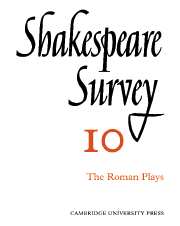Book contents
- Frontmatter
- Shakespeare’s Roman Plays: 1900–1956
- Shakespeare’s ‘Small Latin’—How Much?
- Shakespeare and the Elizabethan Romans
- The Metamorphosis of Violence in Titus Andronicus
- From Plutarch to Shakespeare: A Study of Coriolanus
- The Composition of Titus Andronicus
- Classical Costume in Shakespearian Productions
- Shakespeare’s Use of a Gallery over the Stage
- Lear’s Questions
- “Egregiously an Ass”: The Dark Side of the Moor. A view of Othello’s Mind
- Shakespeare in Schools
- Shakespeare Festival, Toronto, Canada
- International Notes
- Shakespeare Productions in the United Kingdom: 1955
- Drams of Eale, A Review of Recent Productions
- The Year's Contributions to Shakespearian Study 1 Critical Studies
- 2 Shakespeare’s Life, Times and Stage
- 3 Textual Studies
- Books Received
- Index
- Plate Section
“Egregiously an Ass”: The Dark Side of the Moor. A view of Othello’s Mind
Published online by Cambridge University Press: 28 March 2007
- Frontmatter
- Shakespeare’s Roman Plays: 1900–1956
- Shakespeare’s ‘Small Latin’—How Much?
- Shakespeare and the Elizabethan Romans
- The Metamorphosis of Violence in Titus Andronicus
- From Plutarch to Shakespeare: A Study of Coriolanus
- The Composition of Titus Andronicus
- Classical Costume in Shakespearian Productions
- Shakespeare’s Use of a Gallery over the Stage
- Lear’s Questions
- “Egregiously an Ass”: The Dark Side of the Moor. A view of Othello’s Mind
- Shakespeare in Schools
- Shakespeare Festival, Toronto, Canada
- International Notes
- Shakespeare Productions in the United Kingdom: 1955
- Drams of Eale, A Review of Recent Productions
- The Year's Contributions to Shakespearian Study 1 Critical Studies
- 2 Shakespeare’s Life, Times and Stage
- 3 Textual Studies
- Books Received
- Index
- Plate Section
Summary
It is through the malice of this earthly air, that only by being guilty of
Folly does mortal man in many cases arrive at the perception of sense.
herman melvilleThere are three schools of Othello criticism. The most recent of these is the symbolic school, chiefly represented by G. Wilson Knight and J. I. M. Stewart, who have endeavoured to explain away the difficulties inherent in the traditional psychological interpretation of the Moor by turning the play into a mythic image of the eternal struggle between good and evil, embodied in the noble aspirations of Othello and the cunning cynicism of Iago. This school arose in part as a reaction to an attitude mainly exemplified by Stoll, though already initiated by Rymer and Bridges, according to whom this tragedy ought to be treated as a purely dramatic phenomenon, created by Shakespeare for the sake of sensation and emotional effect. The third school is the traditional school of naturalistic interpretation; it branches off into two main streams: the Romantic critics, from Coleridge to Bradley, take Othello at his own valuation, and seem to experience no difficulty in assuming that his greatness of mind should blind him to Iago's evil purposes; more recent students, however, tend to have a more realistic view of the Moor and to stress the flaws in his character: T. S. Eliot speaks of bovarysme and self-dramatization, while his homonym, G. R. Elliott, asserts that the main tragic fault in Othello is pride.
- Type
- Chapter
- Information
- Shakespeare Survey , pp. 98 - 106Publisher: Cambridge University PressPrint publication year: 1957
- 1
- Cited by



